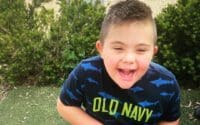DS-ASD Dual Diagnosis Resources
Autism spectrum disorder is a neurological disorder that affects the brain’s development of social and communication skills. As research of developmental disabilities advances, studies are now showing that people with Down syndrome are more likely to have autism than their neurotypical peers. When a person is diagnosed with both Down syndrome and autism, that person is often referred to as having a dual diagnosis or DS-ASD.
Getting & Understanding a Diagnosis
Research into DS-ASD is a relatively new field of study and, as result, many people with Down syndrome and autism remain undiagnosed with the latter. The more information is shared and relationship between Down syndrome and autism is understood, the sooner an individual with DS-ASD can be diagnosed after autistic characteristics first begin to present. Once an individual receives a dual diagnosis, additional resources for support, such as ABA (Applied Behavior Analysis) therapy, are often made available to families.
The NDSS Down Syndrome and Autism pamphlet offers a concise overview of what to do if you suspect your child may have a dual diagnosis and the behaviors that may indicate ASD (see below). Comprehensive information is also available from the Down Syndrome-Autism Connection, the only nonprofit organization dedicated solely to DS-ASD in the United States. Additional reading can be found at the websites for the National Down Syndrome Society and Down Syndrome Resource Foundation.
Behaviors to Notice
If you believe your child should be evaluated for ASD, the West Michigan providers listed below are available to provide testing and a diagnosis to families.
Community Supports
Resources listed are not necessarily endorsed by DSAWM, but are a list of options that are available. If you know of additional West Michigan resources, please let us know at info@dsawm.org.
West Michigan Parents Share Their Stories

The Wigger Family
When her son Owen was diagnosed with autism 2 1/2 years after his Down syndrome diagnosis, Amy struggled to come to terms with the added challenges that a dual diagnosis would have on her son’s life. As new research shows that DS-ASD dual diagnoses are becoming more prevalent, Amy is embracing her role as an advocate for children like Owen.




